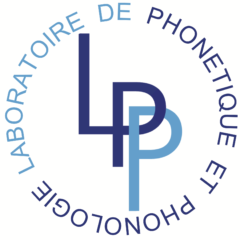What if it’s just breathing? – [h] and [ʔ] perception in late French-German bilinguals
Résumé
We know that phoneme perception differs from other acoustic events such as melodies but also surrounding noises and coughs and sighs (Liberman et al., 1967). To what extend non- native perception is affected if a non-native phone might be confounded with a non-speech event? In order to answer this question, we investigated the perception of German [h] and [ʔ] in late French learners of German using EEG (electroencephalography) technique. Participants’ brain activity was recorded during a passive oddball paradigm which is known to elicit Mismatch Negativity (MMN), an automatic auditory response to new events in the acoustic environment (Näätänen et al., 1978; Näätänen and Gaillard, 1983; Sams et al., 1983; Nyman et al., 1990) sometimes followed by P3a (Yamaguchi and Knight, 1991a,b; Fiori- Duharcourt and Isel, 2012). The oddball paradigm comprises trials with frequent standard and rare deviant (odd) stimuli (Remington, 1969; Squires et al., 1976). If non-native listeners filter out a phone because it’s processed as non-relevant, no MMN or P3a should be elicited.
All used speech stimuli were naturally produced by seven female German native speakers leading to a multi-speaker experiment. A multi-speaker setting presents the advantage that the acoustic environment is constantly modified even among standard stimuli. In this type of experiment, participants’ auditory responses reflect the change in phones rather than the change of the acoustic environment alone (Winkler, 2003). Both German natural and pseudo- word minimal pairs with word-initial [h] or [ʔ]: hüssen [ˈhʏsən] (pseudo-word); üssen [ˈʔʏsən] (pseudo-word) (see Figure 1) or word internal [h] or [ʔ]: geheilt [gəˈhɑ͜ ɪlt] (healed) vs. geeilt [gəˈʔɑ͜ ɪlt] (hurried) were recorded. The choice of contrasting [h] with [ʔ] lies in the properties of the German language where empty vowel onsets are rare in native speech. A preliminary behavioral perception experiment showed that late French-German bilinguals do not discriminate well [h] from [ʔ] even after increased awareness (Wottawa, 2020). This is why, we carried out this neuro-imaging experiment in order to investigate if late French-German bilinguals present the involuntary auditory response when confronted to [h] and [ʔ].
20 participants were recruited in Germany (German natives) and France (late French-German bilinguals) respectively. All participants were aged between 18 and 35 years, right-handed, normal hearing, and had normal or corrected vision. Additionally, German natives had sole German as a first language (L1) and no or very limited knowledge of Romance languages. Late French-German bilinguals had only French as L1 and were in regular contact with the German language throughout the past year by taking classes or at their work place. Furthermore, late French-German bilinguals were recorded reading a German text aloud before the experiment. These recordings will be used in order to investigate the link between successful production and perception of [h]. Prior production studies have shown that late French-German bilinguals produce [h] at syllable onsets without much difficulties (Wottawa et al., 2018).
Preliminary results from the EEG data indicate that the [h]-[ʔ] opposition does not elicit an MMN or P3a response in late French-German bilinguals. Minimal pairs presented with this type of non-native opposition in a multi-speaker setting seem to be not relevant enough. Analysis of the speech data is currently undergoing and will be presented in the final talk.
In German natives, preliminary results indicate that word-initially, the opposition elicits an MMN with a higher amplitude than word-internally. A more detailed phonetic analysis of the natural speech stimuli i.e. duration of [h] and the presence of voicing might shed some light on this processing difference. Results of these analyses will also figure in the final talk.


